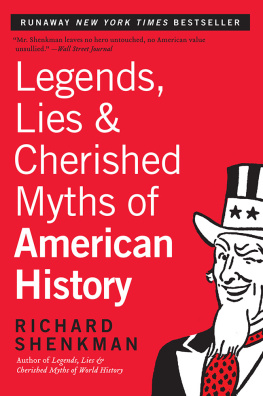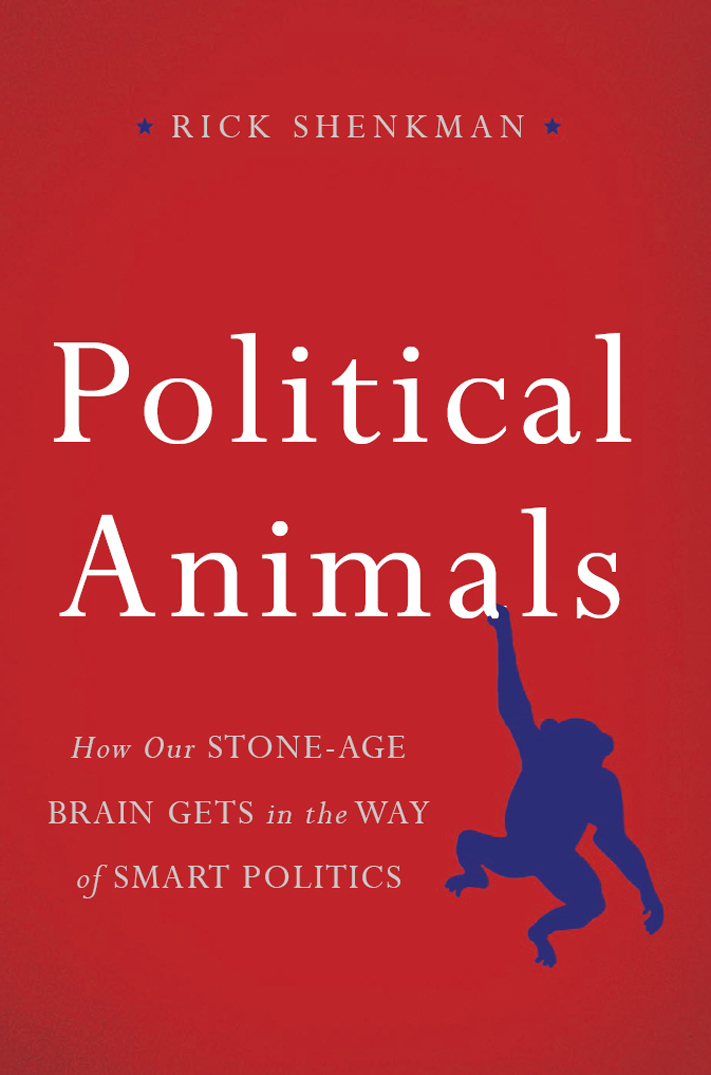Praise forPolitical Animals
Politics in America has this Alice in Wonderland quality: what makes sense often doesnt happen, and what happens often doesnt make sense. Drawing on science, history, psychology, mounds of evidence, and political insight, Rick Shenkmans masterful book shows us why. What Malcolm Gladwells The Tipping Point does for society, Political Animals does for politics.
Leonard Steinhorn, professor of communication and affiliate professor of history, American University
For generations political scientists have argued over whether voters address political issues rationally. Rick Shenkman vigorously asserts that for the most part they make decisions that more closely resemble the instinctual behavior of animals and early prehistoric man. He further argues that our institutions encourage such choices. Clearly written and accessible to ordinary readers, this book is an important contribution to an ongoing debate.
Alonzo L. Hamby, author of Man of Destiny: FDR and the Making of the American Century
A fascinating, well-told account of how our nature both prepares and ill-prepares us for politics in the modern age.
George E. Marcus, professor of political science, Williams College
In Political Animals, historian Rick Shenkman makes excellent use of the latest research in behavioral sciences to indicate why we Americans so often fail politically. And in highly readable prose he also provides wise advice on how we can do better.
Walter G. Moss, professor emeritus of history, Eastern Michigan University, and author of An Age of Progress?: Clashing Twentieth-Century Global Forces
The most predictable thing about politics is that its often unpredictable. In his fascinating and illuminating new book, Rick Shenkman discovers the problem isnt with our fancy statistical models or forecasts, its with our brains. When it comes to politics, humans sometimes do things that just dont make sense.
Taegan Goddard, founder and publisher of Political Wire
Political Animals

Copyright 2016 by Rick Shenkman
Published by Basic Books
A Member of the Perseus Books Group
All rights reserved. Printed in the United States of America. No part of this book may be reproduced in any manner whatsoever without written permission except in the case of brief quotations embodied in critical articles and reviews. For information, address Basic Books, 250 West 57th Street, New York, NY 10107.
Books published by Basic Books are available at special discounts for bulk purchases in the United States by corporations, institutions, and other organizations. For more information, please contact the Special Markets Department at the Perseus Books Group, 2300 Chestnut Street, Suite 200, Philadelphia, PA 19103, or call (800) 810-4145, ext. 5000, or e-mail .
Typeset in 10.5 point Guardi by the Perseus Books Group
Library of Congress Cataloging-in-Publication Data
Shenkman, Richard, author.
Political animals: how our Stone Age brain gets in the way of smart politics / Rick Shenkman.
pages cm
Includes bibliographical references and index.
ISBN 978-0-465-07382-5 (e-book) 1. Political psychologyUnited States. 2. Personality and politicsUnited States. 3. Political culture--United States. I. Title.
JK1726.S54 2015
320.01'9dc23
2015024591
10 9 8 7 6 5 4 3 2 1
For my remarkable mother, Phyllis Shenkman, who, in going back to school in her eighties, left a powerful example in the way she lived her life for the way I want to live mine.
Table of Contents
Guide
Contents
One day in 1891, a wealthy world traveler who enjoyed puncturing public myths offered $500 to anybody who could prove that a shark had ever attacked a human being off the East Coast of the United States. The offer drew headlines. People were sure hed have to make a payment. They were wrong.
This came as no surprise to the countrys leading shark experts. They had long reached the conclusion that the man-eaters that sailors often talked about darkly were highly unlikely to appear in our non-tropical waters. There simply was no proof, the experts categorically stated, that sharks found in the vicinity of Americas East Coast seaside communities ever went after human beings, except perhaps by mistake. What then lay behind the grave fear of sharks among people living along the coast? The experts chalked it up to pure superstition. They maintained this for decades.
In 1916, on the eve of the summer vacation season, as they had on occasion in the past, the experts reassured the public that they had nothing to fear from sharks. This wasnt a matter of opinion, they insisted. It was science.
And then the calendar page flipped to Saturday, July 1.
That day, the Vansants of Philadelphia crossed the Delaware River into New Jersey in time to catch the 3:35 P.M. train from Camden to the Jersey Shore. A little after 5 P.M., they arrived in Beach Haven, an elegant resort community some twenty miles north of Atlantic City, and then checked into the Engleside Inn, one of the finest hotels in the area. While his parents relaxed, Charles Vansant, dressed in a black swimsuit that stretched from his knees to his neck, headed to the ocean for a swim. It was shortly before 6 P.M.
Vansant was a college man. He had made varsity in two sports, golf and baseball. Upon hitting the water he fearlessly swam farther out than anybody else. But as a group of onlookers watched him playing with a paddling dog, he suddenly began to shriek for help. Something was dragging him under.
It was a shark. As Vansant fought for his life, his blood turned the seawater bright red. A brave lifeguard quickly swam to help, dragging Vansant toward shore. But the shark hung on. Not until the fish scraped the pebbles on the bottom of the ocean as they neared shore did it finally swim off. By then it was too late. Little more than an hour after he had stepped off the train from Camden, Charles Vansant, athletic and fearless, was dead. He was twenty-five years old.
Five days later Charles Bruder, the bellboy captain at the Essex and Sussex, a top-notch hotel in Spring Lake, forty-five miles north of Beach Haven, went for a swim on his lunch break. In full view of hundreds of tourists, including the well-known socialite Mrs. George Childs, a shark attacked him. Mrs. Childs reported seeing the shark dart at Bruder just as an airplane attacks a Zeppelin. As he screamed, the shark took off his right leg above the knee and then went after his left foot. Women watching the gruesome scene vomited and fainted. Charles Bruder, in shock, died shortly thereafter on the beach, his body a tangled mess of bones and cartilage. He was twenty-eight years old.
More shark attacks followed. In one attack, a shark ventured up a creek all the way to the small New Jersey community of Matawan, sixteen miles inland, far past where anybody had ever thought a shark might go, and killed a boy out for a swim and a man who tried to save him. Finally, a seasoned angler, fishing from a beat-up boat early one morning, caught a shark and killed it. Though no one was sure this one shark had been responsible for all of the attacks, its death ended the terror that had gripped the seaside communities of New Jersey for two weeks and ruined the local economy. No one else that summer felt the jaw of a shark sink into their flesh.










